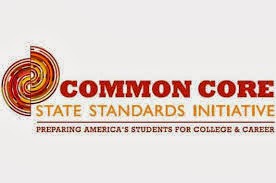Say the words “Common Core” to a teacher or librarian and get ready to hear some heavy sighs. It’s exhausting hearing about one topic so much, let alone figuring out how to align curricula to it.
However, as far as I can tell, the fairly open-ended standards of the Language Arts Common Core mean that just about any novel can go along perfectly with them! What novels don’t have themes or settings or points-of-view to discuss?
I’d like to make a case that mysteries, in particular, are a great fit:
1) Mysteries reward close reading
 Looking carefully at a text and citing examples for interpretations is a major focus of the Common Core. With possible clues hiding at every turn, a fast-paced mystery with substance can keep students focused and immediately understand the rewards of paying close attention. It’s much more fun to look at how lines reveal character (CCSS.ELA 8.RL.3) when figuring out which characters are trustworthy and which are suspects, isn’t it?
Looking carefully at a text and citing examples for interpretations is a major focus of the Common Core. With possible clues hiding at every turn, a fast-paced mystery with substance can keep students focused and immediately understand the rewards of paying close attention. It’s much more fun to look at how lines reveal character (CCSS.ELA 8.RL.3) when figuring out which characters are trustworthy and which are suspects, isn’t it?
2) Mysteries encourage analysis, making predictions and drawing inferences1) Mysteries reward close reading
 Looking carefully at a text and citing examples for interpretations is a major focus of the Common Core. With possible clues hiding at every turn, a fast-paced mystery with substance can keep students focused and immediately understand the rewards of paying close attention. It’s much more fun to look at how lines reveal character (CCSS.ELA 8.RL.3) when figuring out which characters are trustworthy and which are suspects, isn’t it?
Looking carefully at a text and citing examples for interpretations is a major focus of the Common Core. With possible clues hiding at every turn, a fast-paced mystery with substance can keep students focused and immediately understand the rewards of paying close attention. It’s much more fun to look at how lines reveal character (CCSS.ELA 8.RL.3) when figuring out which characters are trustworthy and which are suspects, isn’t it?Reading mysteries are all about subtext, making logical deductions, and predicting what’s going to happen next – all bedrocks of the Common Core.
In fact, several of the standards even seems especially designed for mysteries: “Analyze how differences in the points of view of the characters and the reader create such effects as suspense or humor.” (RL8.6) or “Cite textual evidence to support analysis of what the text says explicitly as well as inferences drawn from the text.” (RL.6.1)
(Though I wish students good luck analyzing what makes something funny. I'm not sure anyone has ever succeeded at that.)
3) Mysteries are high-interest but also often have significant “text complexity”
The Common Core focuses on deeper comprehension of challenging texts as a way of counteracting our culture of skimming. Mysteries are by their very nature complex – they have to be to avoid being totally predictable! Plot twists, non-linear narratives, and a large cast of characters are common. Best of all? Mysteries don’t seem complex or impenetrable; kids are highly motivated to keep turning the pages to get to the resolution.
4) Mysteries inspire fun potential writing assignments (that meet the CCSS standards)!
A key part of the standards revolves around writing persuasively: how do you support an opinion with evidence? This could be an especially fun assignment when it comes to a mystery! Students can put forth their own theories about suspects as they read and present their reasoning to classmates.
Of course, narrative writing is an important part of the Common Core, as well. I may be biased, but what’s more fun than writing your own mystery?
Hope you’ll check out our books to see if any might be a good mystery choice for your class. You could even win one if you act fast - F.T. Bradley's DOUBLE VISION: CODE NAME 711 is hot off the presses and we're running a contest through the end of today.
Note: You can find a CCSS-aligned discussion guide for The Wig in the Window here. Interested in a 20 minute Skype session for your class? Let me know. They are free for any class who's reading the book (I'm all full for the fall but am currently scheduling for the winter and spring.)
Note: You can find a CCSS-aligned discussion guide for The Wig in the Window here. Interested in a 20 minute Skype session for your class? Let me know. They are free for any class who's reading the book (I'm all full for the fall but am currently scheduling for the winter and spring.)
-----------------------------------------------------------------------------------------------------------------------
Kristen Kittscher was a child neighborhood spy but (allegedly) grew up to be an upstanding citizen, seventh grade English teacher, and writing tutor. A graduate of Brown University, she lives in Pasadena, California with her husband, Kai. The Wig in the Window is her first novel. Visit kristenkittscher.com to investigate more about her.
Kristen Kittscher was a child neighborhood spy but (allegedly) grew up to be an upstanding citizen, seventh grade English teacher, and writing tutor. A graduate of Brown University, she lives in Pasadena, California with her husband, Kai. The Wig in the Window is her first novel. Visit kristenkittscher.com to investigate more about her.





No comments:
Post a Comment